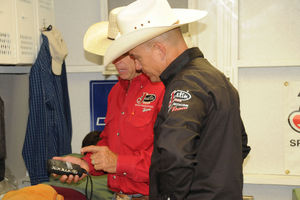
In a room behind the bustling chutes and alleys of the Sidney Iowa Championship Rodeo arena, members of the Justin Sports Medicine program are hard at work.
These men and women, more than 90 percent of them volunteers, are dedicated to treating or preventing injuries to rodeo athletes.
“If it wasn’t for these guys, I don’t know how many of us would be able to continue down the road every day,” said professional freestyle bullfighter Tate Roads. “They help keep my ankles intact so they don’t give out during the bullfight. I also had a shoulder injury, and they used a shock treatment on it that had it feeling better real quick.”
Mike Livergood, the head athletic trainer at Bellevue University, has volunteered with Justin Sports Medicine for more than 20 years, either at the Sidney rodeo or Omaha’s River City Roundup.
“It’s fun to come out here and help these guys. They are really appreciative of what you do for them,” Livergood said. “They just come in and we take good care of them.”
Pulled muscles, torn ligaments, broken bones, torn ACLs and stitches are often what Livergood sees, but it’s also about preventing injuries.
“We also spend a lot of time teaching cowboys, because a lot of the time they’re out there on their own. It’s just as much preventive as it is anything else. We teach how to wrap properly and go through exercises for stretching, whether they’re in a hotel room or sitting on a tailgate.”
On Tuesday, the first performance of the rodeo, the sports medicine team treated 11 and helped seven others with supplies, such as wrap, tape and ibuprofen.
“It varies with each performance; mostly chronic and preventive taping,” Livergood said.
As an athletic trainer for just as long as he’s been with Justin, Livergood said he enjoys his profession because there is something new every day and because of the people he meets.
“I like the different personalities and the different injuries that come along daily.”
The Justin Sports Medicine program was started in 1980 by Dr. J. Pat Evans and Don Andrews, who thought of providing mobile medical support to professional rodeo athletes at venues where they compete.
After much brainstorming, they created a system across the country so that regardless of where rodeos were held, there was a network of physicians, athletic trainers, orthopedics, massage therapists and trauma surgeons, along with clinics and hospitals, able to provide top-notch medical care to Professional Rodeo Cowboys Association contestants. A year later, the Justin Boot Co. agreed to become the sponsor for the program.
During the first few years of the program, an average of 10 PRCA rodeos were attended and roughly 775 contestants were treated. Today, however, the program provides services at roughly 125 rodeos and to 6,000 contestants.
Services are mostly provided in locker rooms or small facilities like the one in Sidney. However, the program also has fully equipped 40-foot mobile centers, as well as two permanent facilities situated in Guthrie, Oklahoma, and Mesquite, Texas.
In 2010, after the retirement of Evans and Andrews, Dr. Tandy Freeman and Mike Rich took over as executive directors of the program. One of the additions to the program from the new leaders was injury-tracking computer software to track the ever-traveling contestants.
“We have a printout of the contestants that were injured over the past couple weeks, where they were injured, what they injured and so forth,” Livergood explained. “It’s real helpful because it wouldn’t be uncommon for one of those guys to come walking in here.”
But the coolest part of the program, Livergood said, is that it doesn’t cost the cowboys a dime.
Rick Foster of Longmont, Colorado, who works for Justin Sports Medicine as an athletic trainer, said he couldn’t imagine having a better job than traveling around the country helping out rodeo athletes.
“These guys know to take advantage of our services when they’re available and it shows a lot what the PRCA is doing to help their rodeo athletes,” Foster said.
Dr. Jonathan Buzzell of OrthoWest, Nebraska Orthopedics Hospital, has been a volunteer with Justin Sports Medicine for six years. As someone who competed in high school rodeos, Buzzell said he really enjoys the environment.
“Of all the athletes, I think these are the most fun to take care of, but these are the athletes that can be injured the most severely.”
In cases of severe injuries, Foster said, the Justin Crisis Center Fund steps in to help those in need. The Justin Boot Co., in cooperation with the PRCA and the Women’s Professional Rodeo Association, formed the organization in 1989.
Professional freestyle bullfighter Weston Rutkowski said he never misses a chance to get a little extra assistance from Justin Sports Medicine. Rutkowski suffered a serious ankle injury less than six months ago. The 26-year-old Texan said a mixture of electric shock and ice does the trick to help his recovering ankle.
“It helps warm my muscles and ligaments back up to where I can get more movement and a whole lot of flexion back, and not much pain,” Rutkowski said. “Without these guys, it’s a night and day difference compared to if they weren’t here.”
ORIGINAL ARTICLE:
http://www.omaha.com/news/iowa/team-of-medics-work-to-keep-rodeo-athletes-in-top/article_2dd3622a-435a-5403-abb1-88409b033870.html